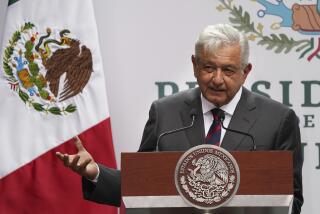Opinion: MexicoLeaks -- the latest way Mexicans are saying “basta ya” to corruption

Mexico is currently the 10th most dangerous country for journalists, after places like Syria, Ukraine and Somalia that are torn by civil war and terrorist insurgencies. But it has had particularly bloody years in the recent past, when drug cartels assassinated journalists with regularity and impunity for writing about them.
According to the Committee to Protect Journalists, 73 journalists have been killed while on the job or because of the job since 1992. Many more are missing and presumed dead -- and many reporters must worry every day whether they will be next.
A digital tool released last week, MéxicoLeaks, should help make it safer for the country’s journalists -- or really anyone -- to break stories about the cartels and political corruption without fear of being killed for it. Started by a handful of the country’s journalists and supported by some news organizations, MéxicoLeaks is an anonymous whistleblower online site and Twitter account (@MexLeaks) modeled on WikiLeaks.
It’s not just an anonymous spot for people to spout off, at least not according to its operators. All documents submitted will be vetted and verified before being published.
At the bottom of the main MéxicoLeaks page, the mission of the site is made clear through the appeal to “help us build a more transparent, democratic and just Mexico.”
The site has already sparked controversy. Two of the founding journalists were fired from their day jobs for participating, and popular radio host Carmen Aristegui, on whose team the two worked, was fired a few days later. Aristegui is credited with breaking the scandal over a luxury home that has embroiled Mexican President Enrique Peña Nieto and his telenovela star wife.
That sucks, of course. But canning a few journalists, rather than disappearing them, is actually a pretty good outcome in a country with a long history of institutional corruption and violence toward truthtellers.
Like the widespread demonstrations after the 43 students were kidnapped and allegedly killed at the order of a local official, MéxicoLeaks is one more piece of evidence that the country’s long tradition of graft, corruption and violence is no longer acceptable to the Mexican public.
Follow Mariel Garza on Twitter @MarielGarzaLAT
More to Read
A cure for the common opinion
Get thought-provoking perspectives with our weekly newsletter.
You may occasionally receive promotional content from the Los Angeles Times.







